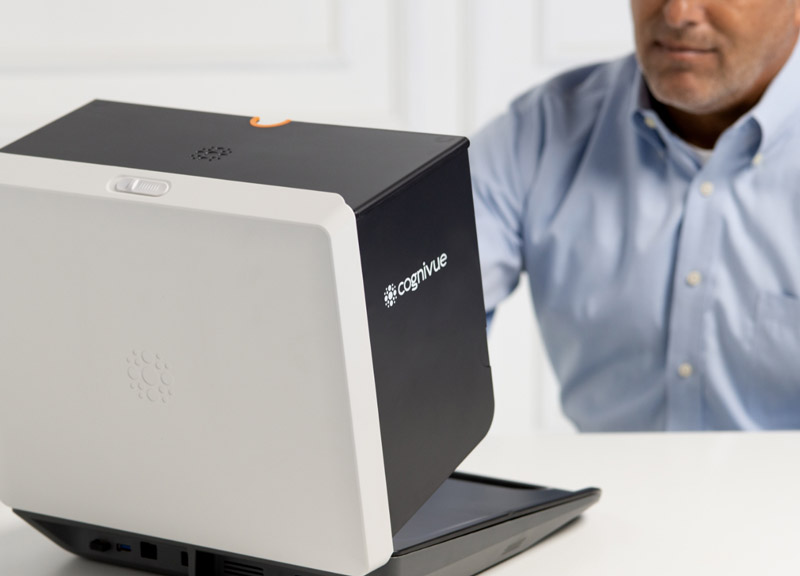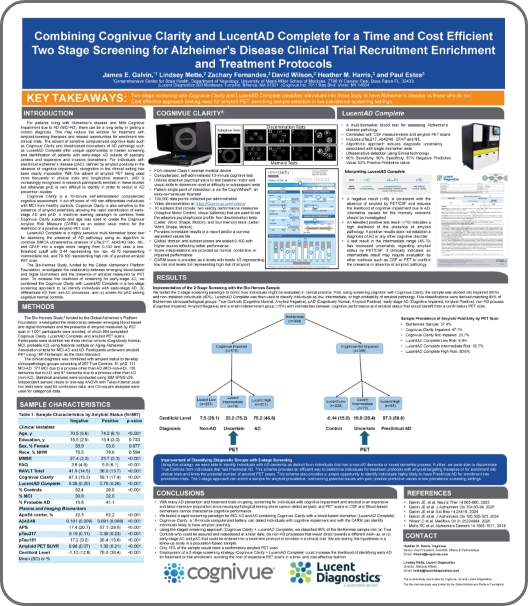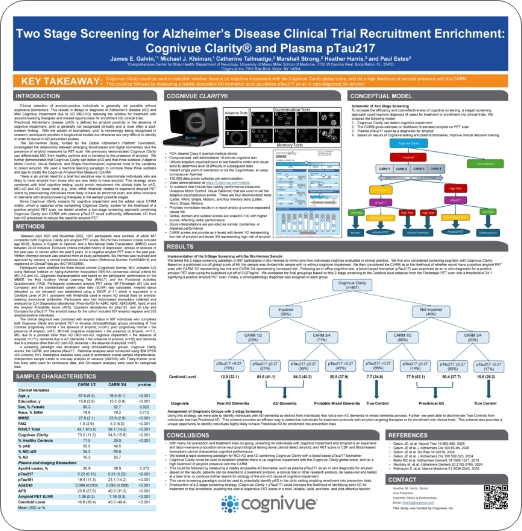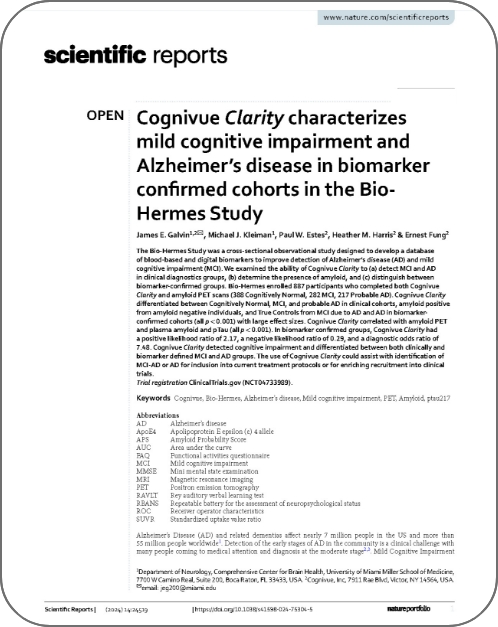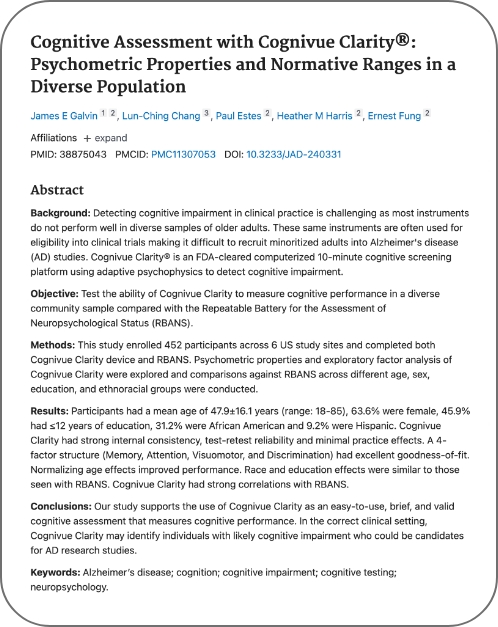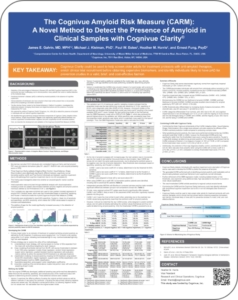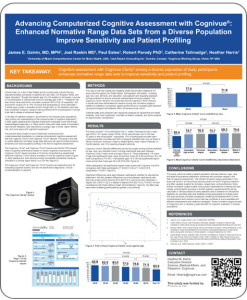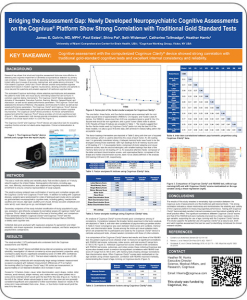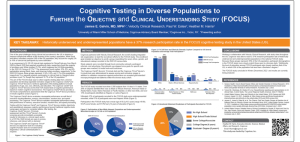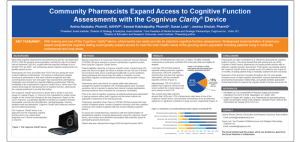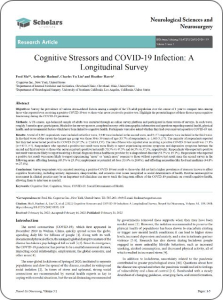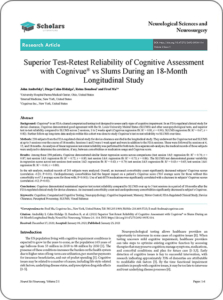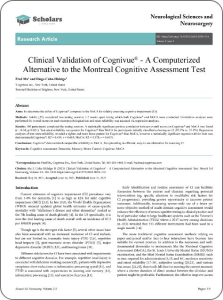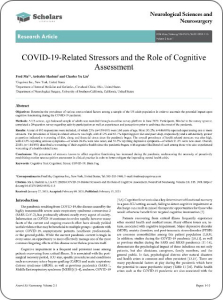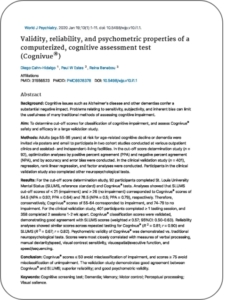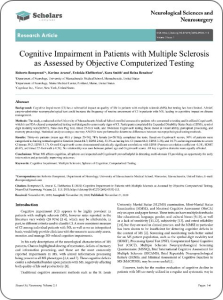©2025 Cognivue, Inc. | Privacy Policy | References
Authors: James E. Galvin, Michael J. Kleiman, Heather M. Harris, Paul W. Estes
Journal: Neurology and Therapy
Year Published: 2025
Key Findings: Demonstrates a new metric, the Cognivue® Amyloid Risk Measure (CARM),* which derives its score from several of Cognivue Clarity®’s cognitive assessment subtests and was developed to predict the presence of amyloid in individuals with or without cognitive impairment. CARM combined with the overall Cognivue Clarity cognitive assessment score could help identify individuals with and without cognitive impairment due to AD or non-AD etiologies.
+ View More – View Less
Objective: To test whether Cognivue Clarity® can differentiate True Controls, preclinical Alzheimer’s disease (pAD), mild cognitive impairment (MCI) due to Alzheimer’s disease (MCI-AD), AD, and MCI and dementia due to non-AD etiologies enrolled in the Bio-Hermes Study.
Study Design:
- Focused on a sample of 887 participants in the Bio-Hermes Study for analyses—only those who completed Cognivue Clarity, as well as both amyloid PET scan and AD blood-based biomarkers were included in analyses
- Sample included cognitively normal individuals (True Controls), cognitively normal individuals with the presence of amyloid (preclinical AD or pAD), individuals with mild cognitive impairment (MCI), and mild Alzheimer’s disease (AD)/span>
- Used results from three Cognivue Clarity subtests that are sensitive to the presence of amyloid along with age to develop a 4-point amyloid-specific marker called the Cognivue Amyloid Risk Measure (CARM)
Results Summary :
- Cognivue Clarity reliably differentiated cognitively normal individuals from cognitively impaired individuals (p<0.001, Cohen’s d=0.732)
- Cognivue Amyloid Risk Measure (CARM) reliably differentiated amyloid positive individuals from amyloid negative individuals by PET (p<0.001, Cohen’s d=0.618) and blood-based biomarkers (p’s<0.001)
- Amyloid positivity and cognitive impairment increased across four CARM thresholds (p<0.001)
- Divided four CARM thresholds into low (CARM1/CARM2) and high (CARM3/CARM4) categories; likelihood provided excellent discrimination for amyloid PET positivity (OR: 3.67; 95% CI 2.76-4.89)
- CARM categories differentiated between True Controls, pAD, MCI-AD, AD, and cognitive impairment due to non-AD etiologies (x2=137.6, p<0.001)
- Majority of True Controls and non-AD etiologies falling in CARM1/CARM2, and majority of pAD, MCI-AD, and AD falling in CARM3/CARM4
Main Takeaways
- Cognivue Clarity is able to detect individuals with cognitive impairment
- Three of the Cognivue Clarity subtests were benchmarked against amyloid PET and used to develop the CARM score which can predict the presence of amyloid
- CARM combined with the overall Cognivue Clarity cognitive assessment score could help identify individuals with and without cognitive impairment due to AD or non-AD etiologies
- These findings underscore Cognivue Clarity’s ability to help screen for treatment protocols with anti-amyloid therapies, enrich clinical trial recruitment, and help to identify pAD for prevention studies
*Patent Pending
Authors: James E. Galvin, Michael J. Kleiman, Paul W. Estes, Heather M. Harris, Ernest Fung
Journal: Journal of Alzheimer’s Disease
Year Published: 2025
Key Findings: Demonstrates Cognivue Clarity®’s ability to screen for individuals with cognitive impairment, characterize amyloid positive individuals, and detect Preclinical Alzheimer’s disease (AD). This has great potential as a cost- and time-effective strategy to screen and enroll in AD prevention trials.
+ View More – View Less
Objective: Examined differences in Cognivue Clarity performance (a) between amyloid positive and amyloid negative individuals, (b) whether Cognivue Clarity could differentiate True Controls (cognitively normal/amyloid negative), Preclinical AD (cognitively normal/amyloid positive), and MCI due to AD (MCI-AD, cognitively impaired/amyloid positive).
Study Design:
- Focused on a sample size of 505 from the enrolled participants in the Bio-Hermes Study for analyses on the detection of Preclinical AD—only those who completed Cognivue Clarity, as well as both amyloid PET scans and blood-based biomarkers
- Performance was compared between bio-marker-defined groups: True Controls – cognitively normal/amyloid negative (297); Preclinical AD – cognitively normal/amyloid positive (95); and MCI-AD – cognitively impaired/amyloid positive (113)
Results Summary:
- Cognivue Clarity reliably differentiated amyloid positive individuals from amyloid negative individuals (p <0.001)
- Cognivue Clarity global score differentiated True Controls versus Preclinical AD (p =0.014) and significantly differentiated between True Controls and MCI-AD (p <0.001) and between Preclinical AD versus MCI-AD (p <0.001)
- Comparisons of 3-subtests of Cognivue Clarity significantly differentiated True Controls from Preclinical AD [Shape Discrimination (p =0.004), Visual Salience (p =0.008), Adaptive Motor Control (p =0.004)]
- A composite score of the mean of the same 3-subtests more significantly differentiated True Controls from Preclinical AD (p <0.001)
- Cognivue Clarity global score and the 3-subtest mean composite score showed moderate correlations with Amyloid PET (r = -0.433) and pTau217 (r = -0.400)
- The 3-subtest mean composite score identified Preclinical AD in both White and Black participants
- Cognivue Clarity demonstrated a significant correlation with both plasma phosphorylated Tau217 (pTau217) levels and the Amyloid Probability Score (APS)
Main Takeaways
- Cognitive Clarity is able to distinguish between:
- Cognitively Normal/Amyloid Negative vs. Preclinical AD
- Cognitively Normal, MCI and Mild Dementia – regardless of amyloid status
- Composite score of the 3-subtests can distinguish between Cognitively Normal/Amyloid Negative, Preclinical AD, and MCI-AD groups and has significant correlations with amyloid PET, and 2-plasma biomarkers (pTau217 and APS)
- These findings underscore Cognivue Clarity’s ability to detect Preclinical AD, thereby enhancing early diagnosis and facilitating the development of targeted interventions.
Authors: James E. Galvin; Lindsey Mette; Zachary Fernandes; David Wilson; Heather M. Harris; and Paul Estes
Conference Poster: Clinical Trials on Alzheimer’s Disease Conference (CTAD)
Year Presented: 2025
Key Findings: Employment of a 2-stage screening strategy (Cognivue Clarity + LucentAD Complete) could increase the likelihood of identifying early AD for treatment or trial enrollment while avoiding the cost of expensive PET scans. This cost-effective approach classifies individuals into those likely to have Alzheimer’s disease vs those who do not, limiting the need for amyloid PET and enriching sample selection in low-prevalence settings.
Authors: James E. Galvin; Michael J. Kleiman; Catherine Tallmadge; Marshall Strong; Tristan Brumagin; Heather M. Harris; and Paul Estes
Conference Poster: Alzheimer’s Association International Conference (AAIC)
Year Presented: 2025
Key Findings: Employment of a 2-stage screening strategy (Cognivue Clarity® + pTau217) could increase the likelihood of identifying early Alzheimer’s disease for treatment or trial enrollment, avoiding the cost of expensive PET scans in a brief, reliable, valid, and time- and cost-effective fashion.
Authors: James E. Galvin, Michael J. Kleiman, Paul W. Estes, Heather M. Harris, Ernest Fung
Journal: Scientific Reports
Year Presented: 2024
Key Findings: Demonstrates Cognivue Clarity®’s ability to reliably differentiate between the cognitively normal, MCI, and mild dementia groups regardless of amyloid status. Therefore, it can provide useful information for consideration for further evaluation with biomarkers and more detailed neuropsychological evaluation in both clinical research and clinical practice settings.
Authors: James E. Galvin, Lun-Ching Chang, Paul W. Estes, Heather M. Harris, Ernest Fung
Journal: Journal of Alzheimer’s Disease
Year Presented: 2024
Key Findings: Supports the use of Cognivue Clarity® as an easy-to-use, brief, and valid cognitive assessment that measure cognitive performance. In the correct clinical setting, Cognivue Clarity may identify individuals with likely cognitive impairment who could be candidates for AD research studies.
Authors: James E. Galvin, MD, MPH; Michael J. Kleiman, PhD; Paul W. Estes; Heather M. Harris; and Ernest Fung, PsyD
Conference Poster: Clinical Trials on Alzheimer’s Disease Conference (CTAD)
Year Presented: 2024
Key Findings: Cognivue Clarity® could be used to help screen older adults for treatment protocols with anti-amyloid therapies, enrich clinical trial recruitment before obtaining expensive biomarkers, and identify individuals likely to have preclinical AD for prevention studies in a valid, brief, and cost-effective fashion. View it in The Journal of Prevention of Alzheimer’s Disease, page 201.
Authors: James E. Galvin, MD, MPH; Michael J. Kleiman, PhD; Paul W. Estes; Ernest Fung, PsyD; and Heather M. Harris
Conference Poster:The Alzheimer’s Association International Conference (AAIC)
Year Presented: 2024
Key Findings: Cognivue Clarity® has great potential as an enrichment strategy for Alzheimer’s disease (AD) clinical trials testing amyloid-lowering therapies as well as for AD prevention.
Authors: James E. Galvin, MD, MPH; Michael J. Kleiman, PhD; Heather M. Harris; Paul W. Estes
Conference Poster:The American Academy of Neurology (AAN) Annual Meeting
Year Presented: 2024
Key Findings: Cognivue Clarity® discriminated healthy controls from those with Mild Cognitive Impairment (MCI) and Alzheimer’s disease (AD), strongly correlated with AD biomarkers, and had strong psychometric properties.
Data is also published in Neurology, Volume 102, Number 17 Supplement 1, 2024. View it in Neurology
Authors: James E. Galvin, MD, MPH, Joel Raskin, MD, Paul Estes, Robert Parody PhD, Catherine Tallmadge, Heather Harris
Conference Poster: Clinical Trials for Alzheimer’s Disease (CTAD) Annual Conference
Year Presented: 2023
Key Findings: Cognitive assessment with Cognivue Clarity® among a diverse population of study participants enhances normative range data sets to improve sensitivity and patient profiling.
Data is also published in The Journal of Prevention of Alzheimer’s Disease, Volume 10, Supplement 1, 2023. View it in The Journal of Prevention of Alzheimer’s Disease, page 225.
Authors: : James E. Galvin, MD, MPH, Paul Estes, Shiva Pal, Seth Wideman, Catherine Tallmadge, Heather Harris
Conference Poster: Clinical Trials for Alzheimer’s Disease (CTAD) Annual Conference
Year Presented: 2023
Key Findings: Cognitive assessment with the computerized Cognivue Clarity® device showed strong correlation with traditional gold-standard cognitive tests and excellent internal consistency and reliability.
Data is also published in The Journal of Prevention of Alzheimer’s Disease, Volume 10, Supplement 1, 2023. View it in The Journal of Prevention of Alzheimer’s Disease, page 169.
Authors: James E. Galvin, MD, MPH; Velocity Clinical Research; Paul W. Estes; Heather M. Harris
Conference Poster: Alzheimer’s Association International Conference (AAIC)
Year Presented: 2023
Key Findings: Historically underserved and underrepresented populations have a 37% research participation rate in the FOCUS cognitive testing study in the United States (US).
Data is also published in Alzheimer’s & Dementia, Volume 19, Issue S24, Supplement: Developing Topics December 2023. View it in Alzheimer’s & Dementia.
Authors: Amina Abubaka, PharmD, AAHIVP; Saswat Kabisatpathy, PharmD; Susan Lutz; Jessica Sinclair, PharmD
Conference Poster: Alzheimer’s Association International Conference (AAIC)
Year Presented: 2023
Key Findings: With training and use of the Cognitive Clarity® device, pharmacists can easily provide an objective cognitive function assessment. Widespread implementation of pharmacy-based computerized cognitive testing could greatly expand access to meet the brain health needs of the growing senior population including patients living in medically underserved and rural areas.
Data is also published in Alzheimer’s & Dementia, Volume 19, Issue S24, Supplement: Developing Topics December 2023. View it in Alzheimer’s & Dementia.
Authors: Fred Ma, Ardeshir Hashmi, Charles Yu Liu, Heather Harris
Journal: Neurological Sciences and Neurosurgery
Year Published: 2022
Key Findings: Prevalence of stressors known to affect cognitive functioning has increased during the pandemic, underscoring the importance of cognitive testing.
Authors: John Andrefsky, Diego Cahn-Hidalgo, Reina Benabou, Fred Ma
Journal: Neurological Sciences and Neurosurgery
Year Published: 2021
Key Findings: Cognivue demonstrated superior reliability vs SLUMS over 18 months.
Authors: Fred Ma, Diego Cahn-Hidalgo
Journal: Neurological Sciences and Neurosurgery
Year Published: 2021
Key Findings: Cognivue is as effective as MoCA while demonstrating better test-retest reliability. Cognivue also improves opportunities for timely, objective assessment of cognitive function and eliminates the biases.
Authors: Fred Ma, Ardeshir Hashmi, Charles Yu Liu
Journal: Neurological Sciences and Neurosurgery
Year Published: 2021
Key Findings: Prevalence of stressors known to affect cognitive functioning has increased during the pandemic, underscoring the importance of cognitive testing.
FDA Clearance Study
Authors: Diego Cahn-Hidalgo, Paul W Estes, Reina Benabou
Journal: World Journal of Psychiatry
Year Published: 2020
Key Findings: Cognivue demonstrates good agreement with and superior reliability vs the St. Louis University Mental Status (SLUMS, references standard) test. Results of this study were used by FDA for Cognivue device clearance.
Authors: Roberto Bompreszzi, Kerime Ararat, Evdokia Eleftheriou, Kara Smith, Reina Benabou
Journal: Neurological Sciences and Neurosurgery
Year Published: 2020
Key Findings: Cognivue proved helpful in detecting multi-domain cognitive impairment in patients with multiple sclerosis.


